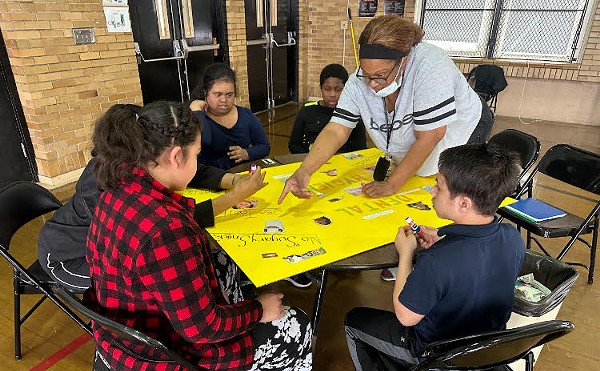Built like a linebacker, sporting a shortly cropped Mohawk, Eric Huggins’ gentle, precise paintbrush strokes produce art that hangs in Los Angeles galleries and New York living rooms.
Standing in StudioWorks, a spacious gallery and art studio dedicated to developmentally disabled adults, Huggins holds up his latest in a series of music-inspired paintings — a portrait of Billie Holliday.
“I’m happy to be here,” Huggins says. “I’ve wanted to be an artist all my life.”
On this gray, rainy morning, about six of StudioWorks’ 32 artists quietly draw and paint as public radio plays overhead. Three staff members, all experienced in fine arts, occasionally lean over offering help.
Located in the Highlands for the last two years, StudioWorks offers a tranquil, creative setting five days a week. It’s a program of the Zoom Group, a nonprofit that offers day training and work opportunities for disabled adults.
Proposed regulatory changes that would affect programs like StudioWorks have caused great concern among advocates and providers, Zoom Group included.
Underneath the long list of bureaucratic tweaks being made to the Supports for Community Living Medicaid waiver program lies an ideological shift at the federal level.
In September, the Center for Medicaid and Medicare Services issued guidance to states emphasizing the need to integrate disabled adults into the work force in hopes of achieving greater personal independence.
“Trying to push people into this stereotypical vision of what it means to be productive isn’t entirely fair,” says Donovan Fornwalt, executive director of The Council on Developmental Disabilities. “We’d like to think that everyone can build a career and everyone can go to college. Or everyone can land a job that pays at least minimum wage. That’s not always true. I think it’s more important to meet people where they’re at.”
Sitting in the gallery of StudioWorks, Kim Prather, Zoom Group’s director of programs, echoes that sentiment. She says while some individuals may fit well working at a restaurant or grocery store, others have extreme needs, be it physical or behavioral, that won’t suit a professional setting.
Furthermore, Prather wants individuals to have the freedom to choose how they spend their days.
She asks a resident artist, Julie Baldyga, an outgoing woman whose popular paintings reflect a fascination with electronics, whether she’d like a job “out in the community.” Baldyga shakes her head no.
“(I) don’t want job in the community,” Baldyga answers. “Half the people won’t be nice to me, won’t want to shake my hand.”
But Stephen Hall, Kentucky’s commissioner of the Department for Behavioral Health, Developmental and Intellectual Disabilities, tells LEO the changes will not diminish choice, but enhance future prospects.
Still, advocates say if you look at where the money’s going, it seems certain programs that have been around for decades are threatened.
Utilizing both federal and Cabinet for Health and Family Services funds, the Supports for Community Living (SCL) waiver program cost close to $265 million last year and served about 3,500 people.
Under the proposed changes, reimbursement rates for day training and certain supervised work programs would drop, from $10-$12 an hour to under $9 an hour. The way the system is set up, for every hour a provider spends with one individual, they’ll receive that per-hour reimbursement. The seemingly small drop can add up, says Prather, whose Zoom Group serves around 200 clients in programs potentially affected by this rate reduction.
“They don’t want us to keep bringing more clients here. They want to encourage us to get those we have out of here,” she says. “So how do you do that? You reduce the reimbursement rate.”
Meanwhile, the reimbursement rate for programs that support disabled adults in a regular job out in the community will double, from $22 an hour to just over $40. Zoom Group currently has 75 clients in this so-called “supported employment” setting.
A significant change to the SCL waiver targets what’s known as “sheltered workshops.”
These are highly supervised settings devoted to piecemeal-type work. For instance, Zoom Group runs one at UPS where their clients package small items. Under the Fair Labor Standards Act, these disabled employees do not necessarily get paid minimum wage. Rather, they’re compensated based on productivity.
It’s a practice deemed unfair by the National Council on Disability. New federal guidelines indicate that Medicaid funds should not be made available to sheltered work settings where individuals are supervised “for the primary practice of producing goods or performing services.”
Stephen Zaricki, president of the Kentucky Association of Private Providers (KAPP), which Zoom Group is a part of, says in an ideal world, all individuals, no matter their disability, would earn minimum wage. But a complex reality prevails.
“It’s certainly reasonable that people feel those things should be phased out. However … not everyone with a disability can work in a job — a regular job — because of their disability,” Zaricki says. “By eliminating that opportunity to do something that they can get paid for in a setting where they’re safe and they don’t require a job coach to be with them the entire time, that’s meaningful work for them.”
(Under the supported employment model, a job coach trains the individual for work and checks in with them about once a month.)
Cindy Goodin’s sister, Donna Shirley, works in Zoom Group’s UPS facility. Goodin, an energetic woman who fiercely defends her developmentally disabled sister, says the sheltered work setting provides a dignified space for those with special needs. She’s witnessed her sister face cruel stares. Goodin can’t help but worry what will happen if Shirley applies for a “normal” job.
“I would challenge these people making these decisions to walk up and down the street with these individuals and see how they’re treated,” she says with tears in here eyes. “And to think that they can walk out in the community and be given a chance is not realistic.”
At least not everybody will be given a chance, she adds.
In the 1980s, Kentucky sat in the top 10 states in the nation for community-based employment of people with developmental disabilities, says Commissioner Stephen Hall. Now Kentucky ranks near the bottom.
Hall hopes the boosted reimbursement rates for supported employment will reverse that. Still, he says Kentucky is not eliminating day training and sheltered work programs, as many fear. He tells LEO individuals can still choose to stay in whatever program they desire.
But case managers must work with clients to devise a formal plan for their future and ensure participation in career planning activities. Also, under the amended waiver, case managers cannot come from the same company that’s providing the client with day training or other services.
“The federal government is absolutely insisting that the person who oversees the quality of the services and supports … is not employed by the same company that’s paid to actually deliver those services,” Hall says.
Dubbed “conflict free” case managers, the idea is that these independent third parties will better assess whether someone could pursue paths that involve joining the work force. (Individuals can keep their current case manager if a long-standing relationship exists.)
Stephen Zaricki, with KAPP, admits many proposed changes are positive. He’s pleased with the focus on individual needs.
“I believe that the true intentions of everyone in this process has been to help people with disabilities to have the very best quality of life,” he tells LEO.
Still, a slew of concerns remain: cuts to therapeutic and behavioral supports, a host of new training and paperwork that Zaricki calls “unfunded mandates.”
But at StudioWorks, worry remains rooted in this push toward community-based employment. Judy Erwin, Zoom Group’s director of regulatory compliance, says forcing career training onto individuals who consider themselves thriving artists doesn’t make sense.
“Again, we’re not against people being in the community,” Erwin says. “We just think the focus should be on them and their choices and let them decide.”
A public comment period on these proposed changes closed Oct. 1. In order to become regulation, they must pass through legislative committees.






